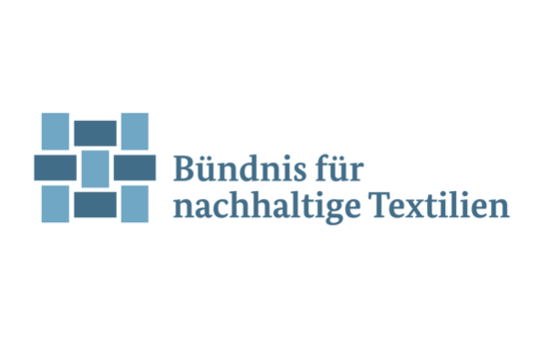The Partnership for Sustainable Textiles is a multi-stakeholder initiative in which some 130 representatives from the worlds of business, policy-making and civil society work together to improve conditions in textile supply chains. The Textiles Partnership focuses in particular on the implementation of corporate due diligence by companies in Germany, Europe and worldwide. To this end, it is guided by key UN, OECD and ILO agreements, and by directives and initiatives in Germany and at EU level.

Aktiv in
- Deutschland
Links
mail@textilbuendnis.comNetzwerk
Liste der PartnerThe Textiles Partnership aims to see a textile and clothing industry that is socially and environmentally responsible and corruption-free, one that respects the rights of all employees, protects the climate and the environment, and operates with integrity within the planetary boundaries. From companies, associations and non-governmental organisations to trade unions, standards organisations and the German Federal Government, the Textiles Partnership is currently home to some 130 members working together to bring about this change.
How do we work?
Implementing due diligence, achieving transparency in supply networks and effectively tackling four focus topics are central to the work of the Textiles Partnership.

1: IMPLEMENTING DUE DILIGENCE
The Partnership’s member companies must publicly demonstrate on a regular basis how they implement due diligence requirements in their supply chains. This also requires enterprises to systematically analyse and prioritise the risks in those supply chains. On this basis, they set themselves targets and identify measures for countering these risks and introducing improvements. Reporting is carried out in accordance with the Textile Partnership’s own Review Process. However, the Partnership also recognises the report to the German Federal Office for Economic Affairs and Export Control (BAFA) under the German Supply Chain Act (LkSG), and the report for Green Button 2.0, as proof of due diligence implementation.
2: ENSURING SUPPLY CHAIN TRANSPARENCY
Companies that wish to minimise their risks must know their supply chain. For many enterprises, achieving transparency all the way to the start of the supply chain is (still) a challenge. Nonetheless, Partnership members are embracing this challenge and progressively achieving transparency deeper in the supply chain. The Partnership for Sustainable Textiles publishes an aggregated list of the production sites and supplier data of its members on the Open Supply Hub. By making reliable supply chain information publicly accessible, the Partnership helps promote transparency in the industry.
3: EFFECTIVELY ADDRESSING FOCUS TOPICS
The Textiles Partnership has identified four topics as the main challenges facing the textile and clothing industry while simultaneously offering significant leverage and potential for making improvements.

All four topics share a common framework, which is based on international standards and recommendations and which sets out the goals being pursued by the Partnership. Additionally, the member companies make individual commitments, which involve the use of standardised indicators by each company to measure its own progress and by the Textiles Partnership to measure overall progress in relation to the focus topics. Partnership members implement projects together in producer countries. This joint action has a direct impact on the ground and makes a quantifiable contribution to the focus topics.
In order to maximise impact and leverage synergies, the Textiles Partnership also works with international and European initiatives and organisations, including the Sustainable Apparel Coalition, the Fair Wear Foundation, the Textile Exchange and the Open Supply Hub.
The Textiles Partnership sees itself as a platform for learning and dialogue. Information and experiences are analysed and shared with all members via webinars and workshops, work in strategy committees and Partnership initiatives and by means of tools and support materials.